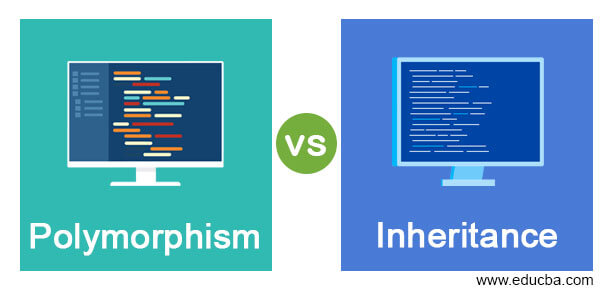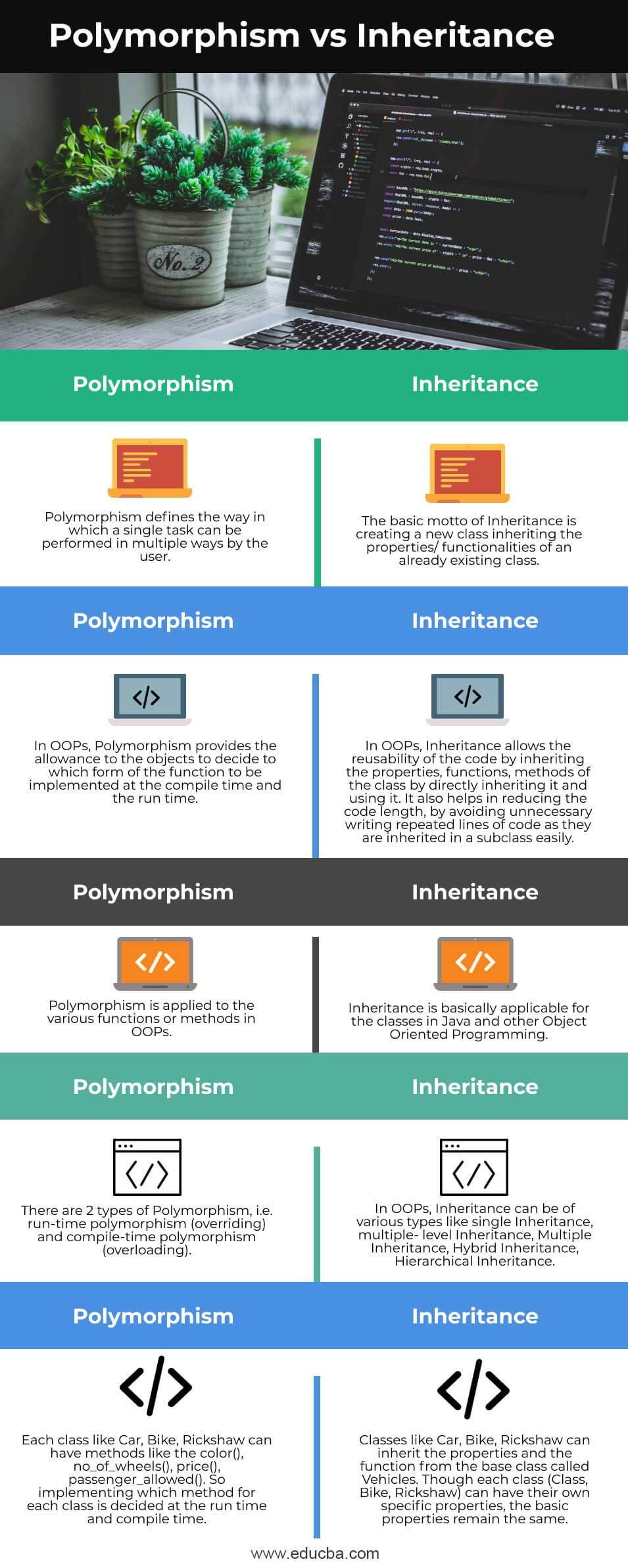
Difference Between Polymorphism vs Inheritance
The following article provides an outline for Polymorphism vs Inheritance. Polymorphism is an important concept of an Object Oriented Programming Language that provides the mechanism to create functions/ methods in multiple ways in order to complete a single task. It allows simplicity, easy code maintainability, and the ability to deal with various scenarios. It increases the code length as a single task is performed in various ways by implementing methods with different signatures.
Inheritance defines the code reusability in which one class inherits the properties, attributes of the already existing class. It means that the child class (inheriting the parent class) does not need to write an already existing property present in the parent class, it only needs to inherit it. Inheritance reduces the lines of code in the program as code is reused directly by inheriting the parent class.
Head to Head Comparison Between Polymorphism vs Inheritance (Infographics)
Below are the top 5 differences between Polymorphism vs Inheritance:

Key Difference Between Polymorphism vs Inheritance
Let us discuss some of the major key differences between Polymorphism vs Inheritance:
- Inheritance in OOPs means that there is a subclass also known as a derived class that inherits the properties of the base class also called a superclass. So when the subclass inherits the superclass all the members of the base class become the members of that subclass also whereas in Polymorphism, ‘Poly’ means ‘many’ ‘morph’ means ‘forms’, so it defines the method of performing any task in various forms.
- The main advantage of Inheritance in OOPs is that it allows the reusability of code. Reusability means that the programmer does not need to write the general code (which is the same as all the classes) instead only the specific code for each class needs to be written. In order to use the general code, specialized classes just need to inherit the main class (base class) whereas Polymorphism allows simplicity, easily manageable code by providing the advantage of a function having many forms and letting the function decide which form to invoke at the compile time and run time.
- Inheritance allows the programmer to create hierarchies of the class by one class inheriting the other class giving its attributes and behavior whereas Polymorphism allows the user to create different methods for different requirements and ensure that the proper method would be executed on the basis of calling the object type.
- Let’s understand with the help of an example, there is an Animal class having the basic properties of an Animal. There are Dog, Cat, Rabbit, etc classes that inherit the Animal class as all the Animal have some common properties. But the classes Dog, Cat, Rabbit can have their specialized method defining their individual properties, this is called Inheritance whereas, in Polymorphism, there is a method called as Area, calculating the area of geometric figures. So for the figures Rectangle, Square, Triangle there are different numbers of parameters like for square, there is one parameter required, for rectangle both the length and breadth are required and for triangle base and height are required. So the ‘Area’ method needs to be implemented differently for each geometric figure.
- Polymorphism, it is of basically 2 types, i.e. run-time polymorphism which is known as method overriding (achieved through the inheritance, when one class inherits the base class) and second is compile-time polymorphism (which is achieved when the different methods are defined in the same class with different signatures) which is known as method overloading whereas with Inheritance one can go crazy and can create any levels depending on the requirements like Single, Multiple, Multilevel, Hierarchical and Hybrid. Though Java, which is an OOP language, does not support multiple inheritances.
- As we have understood, Inheritance is applied to the classes when one class inherits all the properties, attributes, and methods of an already defined class but Polymorphism is applied to the functions/ methods of the classes as it involves defining the methods with the same name and different signatures. Though run-time Polymorphism is applied by implementing the Inheritance in the classes only.
- Talking about the lines of code in the program, Inheritance reduces the lines of code as the child class reuses the code of the parent class by inheriting it whereas, in Polymorphism, the overall length of the program gets increased as a single method is implemented in different ways.
Polymorphism vs Inheritance Comparison Table
Let’s discuss the top comparison between Polymorphism vs Inheritance:
|
Sr. No |
Polymorphism |
Inheritance |
| 1 | Polymorphism defines the way in which a single task can be performed in multiple ways by the user. | The basic motto of Inheritance is creating a new class inheriting the properties/ functionalities of an already existing class. |
| 2 | In OOPs, Polymorphism provides the allowance to the objects to decide to which form of the function to be implemented at the compile-time and the run time. | In OOPs, Inheritance allows the reusability of the code by inheriting the properties, functions, methods of the class by directly inheriting it and using it. It also helps in reducing the code length, by avoiding unnecessary writing of repeated lines of code as they are inherited in a subclass easily. |
| 3 | Polymorphism is applied to the various functions or methods in OOPs. | Inheritance is basically applicable for the classes in Java and other Object Oriented Programming. |
| 4 | There are 2 types of Polymorphism, i.e. run-time polymorphism (overriding) and compile-time polymorphism (overloading). | In OOPs, Inheritance can be of various types like single Inheritance, multiple- level Inheritance, Multiple Inheritance, Hybrid Inheritance, Hierarchical Inheritance. |
| 5 | Each class like Car, Bike, Rickshaw can have methods like the color(), no_of_wheels(), price(), passenger_allowed(). So implementing which method for each class is decided at the run time and compile time. | Classes like Car, Bike, Rickshaw can inherit the properties and the function from the base class called Vehicles. Though each class (Class, Bike, Rickshaw) can have its own specific properties, the basic properties remain the same. |
Conclusion
The above description clearly explains what Polymorphism and Inheritance are and the basic difference between the two. Both Polymorphism and Inheritance are the fundamental concepts of Object Oriented Programming. So in order to write the real OOPs program, it is important for the programmer to understand each of them clearly as they both are used for 2 different purposes as Inheritance allows the code reusability whereas Polymorphism allows defining of a single function in many ways.
Recommended Articles
This is a guide to Polymorphism vs Inheritance. Here we discuss key differences with infographics and comparison tables respectively. You may also have a look at the following articles to learn more –

